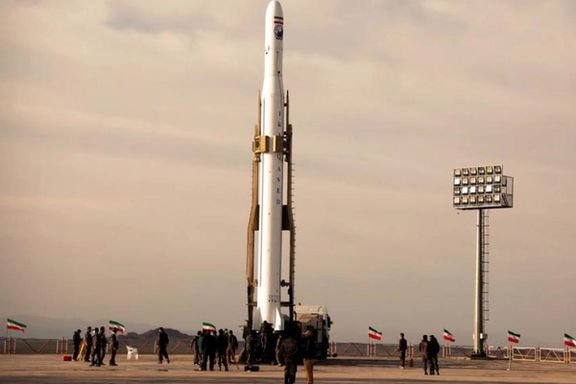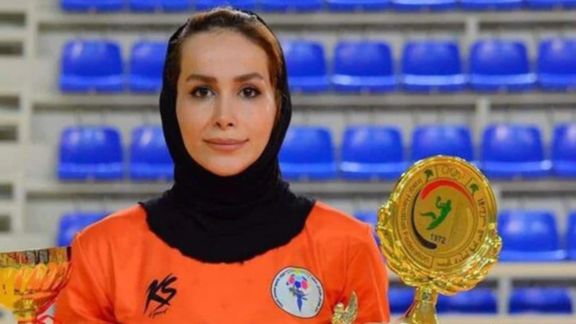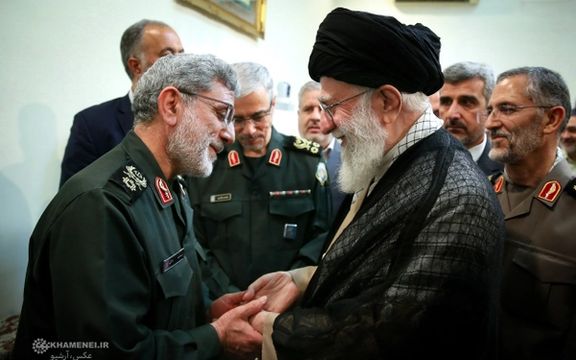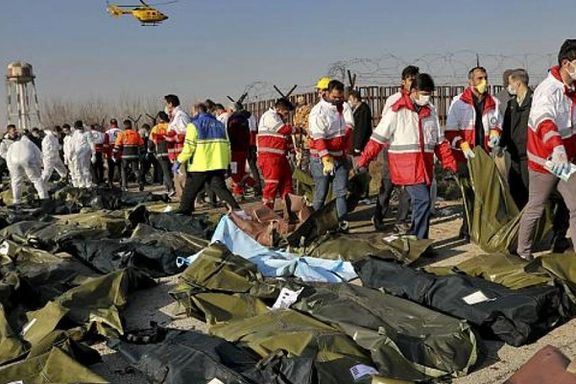Iran Minister Speaks Of 'Good News' About a Satellite Launch Till March

Iran’s communication minister said Saturday "there will be good news” about launching a satellite until March, after recent reports about preparations at a launch site.

Iran’s communication minister said Saturday "there will be good news” about launching a satellite until March, after recent reports about preparations at a launch site.
The Associated Press reported earlier this week that evidence points to Iran preparing a space launch and Iranian media offered a list of upcoming planned satellite launched.
In his first press conference, communication minister Issa Zarepour said that Iran’s space program was put on the backburner during former president Hassan Rouhani’s eight-year administration (2013-2021), but now its budget has increased. He added that the country needs a ten-year plan to expand its satellite program to put vehicles at a higher orbit.
Currently, Iran can reach 500 kilometers into space, which is considered a lower orbit. President Hassan Rouhani ordered officials to aim for the 36,000-kilometer orbit and increased the space program budget up to 12 times.
Foreign observers and governments have charged that Iran's space program is a cover to justify its testing of ballistic missiles. Israel and the United States have said that Iran's space program is against a UN resolution banning Iranian missiles with nuclear weapons capability.

A firebrand senior cleric, and father-in-law of Iran's President Ebrahim Raisi, has called for the “summary trials” of journalists "who echo the ideas of enemies”.
In his Friday Sermon in Mashhad on Friday, Ahmad Alamolhoda, who is a stauch supporter of Supreme Leader Ali Khamenei, accused some of the media in Iran of taking advantage of “freedom of expression”, aiding the enemies of the Islamic Republic, and trying to obstruct the propagation of Islam.
Meanwhile he called on Iranian journalists to propagate Shiite Islam following orders by Supreme Leader Ali Khamenei. Elsewhere in his speech, Alamolhoda said that "The enemies are using their media arsenal to advocate ignorance and to create chaos that would pave the way for their onslaught."
Alamolhoda said the media are trying to distort reality and while it was the West that withdrew form [the nuclear] deal with Iran, the media affiliated with the enemies are trying to portray the case in a way that would lead to the condemnation of Iran." He added that those who echo the enemy's statements in the press and social media are infiltrators who should be put on trial as the enemy's fifth column."
Iran’s hardliners often regard most criticism about domestic and foreign affairs, as well as defense of social and political rights as incendiary, although media in Iran is tightly controlled and hundreds of journalists have been jailed throughout the 43-year existence of the clerical regime.
Meanwhile, Iran’s state TV and Tasnim news agency were forces to slam another cleric and a member of parliament who tried to deny his controversial remarks that Iranians who do not like Islamic restrictions should leave the country.
The cleric, Seyyed Kazem Mousavi later claimed that he never made those comments, and they were fabrications by the media. However, as a tape containing his remarks was leaked on social media, the state television and Tasnim harshly criticized the cleric for portraying Islam as a fundamentalist religion that cannot tolerate modern lifestyle.
A commentator at the state TV lashed out at Mousavi and said" "Who are you to decide about whether people are or are not allowed to live in Iran. This is everybody's home, and they should live here as they like."
According to Aftab News, a moderate conservative website in Iran, Mousavi still owes an apology to Iranian journalists, adding that it is becoming a common practice among Iranian officials to attribute their own comments to the media as soon as they realize what they have said was controversial and counterproductive. "This undermines conservative politician's ethical values and is not a practice consistent with religious ethics by any standard."
The website reminded Mousavi that exposing the hypocritical behavior of politicians is one of the reasons why media exist. The website added that it was easy in the past for politicians like Mousavi to deny what they have actually said or done, and it was difficult for reporters to tell the truth to the public. But nowadays, journalists can always publish a recording of the politician's statement on social media to prove their case.
However, Aftab News added that still, some politicians try to get away with the consequences of their controversial statements or behavior claiming that they made the comment during an off-the-recordprivate conversation.
To provide an example, Aftab New shied away from quoting politicians, and brought an example about an Iranian filmmaker who called film critics idiots during a conversation with several journalist. He even insisted that reporters may quote him on that. However, when his comment became controversial, he criticized several reporters for having fabricated the comment. The website reminded that "Actual quotations remain for a long time while denials are short-lived."

A member of the Iranian women’s handball team has confirmed that after a tournament in Spain she broke away from the team and will not return to the country.
Shaqayeq Bapiri told Voice of America in an interview on Thursday that she decided to stay in the West because of forced hijab rules in Iran and other restrictions. She disappeared from the sports camp a few days ago.
She also disclosed that each member of her team was forced to leave a 15 billion rial guarantee-of-return with Iranian authorities before travelling to Spain for the games. The money, similar to a bond, is more than $50,000 in current exchange rates, but a huge sum for ordinary Iranians. This means Bapiri forfeited the money to be able to seek asylum abroad.
She said in the interview, “We are really restricted. If the [handball] federation had not secured the 15 billion rial guarantee [from players], no one would have returned [to Iran].
Several Iranian athletes in the past two years have defected and sought asylum in other countries. Some took part in this year’s Olympics in Tokyo as non-state athletes.
In addition to dress code restrictions, another issue forcing Iranian sports people to defect is Tehran’s policy of not allowing them to compete against Israelis.

A bipartisan legislation was introduced Thursday at the US Senate Foreign Relations Committee to prevent Iran and its proxy groups from acquiring lethal drones.
The Committee’s ranking member Jim Risch (R-Idaho) and Chairman Bob Menedez (D-NJ) introduced the Senate version of the Stop Iranian Drones Act of 2021, which passed the House of Representatives Foreign Affairs Committee on December 10.
A statement by the Foreign Relations Committee said the legislation “seeks to amend the Countering America’s Adversaries Through Sanctions Act (CAATSA) to include any action that seeks to advance Iran’s UAV program...as sanctionable under U.S. law.”
In an interview with the Associated Press on December 10, commander of CENTCOM Gen. Kenneth McKenzie also expressed concern over the growing capabilities of Iranian missiles and drones.
Iran’s military drone program has expanded in recent years and UAV’s have been more frequently used in attacks in recent months both on land and at sea. Several attacks in Iraq and at least one attack in Syria have targeted US forces.
Senator Risch said, “As we saw with recent Iranian-sponsored drone attacks on American troops and the Iraqi Prime Minister, as well as the constant attacks on Saudi Arabia, Iran’s armed drone capability presents a growing threat to the Middle East.

The US State Department says Iran continues to harbor al Qaeda leaders and sponsor terrorism acts, in its 2020 Country Reports on Terrorism published Thursday.
“There has been facilitation of them that allows them to remain active as leaders within the al-Qaida global enterprise,” the acting Coordinator for Counterterrorism John T. Godfrey said Thursday at a briefing introducing the 2020 report. “No secret, I think, that Iran is a longstanding state sponsor of terrorism, and I think the fact that they have enabled that leadership cadre to safely reside in Iran is a reflection of their use of terrorism as an adjunct of their foreign policy goals.”
Godfrey also said that Iran continued to support terror acts in the region “and further afield in 2020”, supporting proxies in Iraq, Lebanon, Syria, Yemen and Bahrain, including Hezbollah and Hamas.
The United States also continued high-level diplomatic contacts to counter Hezbollah’s presence in Central and South America and in Europe, resulting in nine countries taking “significant steps” in 2020 “to designate, ban, or otherwise restrict” Hezbollah.
In response to a question as to how the Biden Administration is cooperating with Saudi Arabia to counter Iranian proxy forces Godfrey said, “I think Saudi Arabia has faced a particular threat in recent years from the Houthis in Yemen, and obviously that’s a group that has enjoyed quite a bit of support from Iran, and we’ve been public about our concerns about that. And that’s something that we’ve continued to work with them on.”
However, the Biden Administration removed the Houthis from a terror designation list almost as soon as it took office in early February and since then has repeatedly condemned their missile and drone attacks against Saudi Arabia.
In the report itself, the State Department says, “The Houthis continue to receive material support and guidance from Iranian entities, including to enable attacks against Saudi Arabia. These attacks have utilized armed drones and ballistic missiles, which damaged airports and critical infrastructure.”
The report highlights the role of IRGC’s Qods (Quds) Force saying that Iran continued to acknowledge the active role the military-intelligence unit plays in regional conflicts from Iran and Syria to Yemen and elsewhere. It also says that Hezbollah “remained Iran’s most dangerous terrorist partner and the most capable terrorist organization in Lebanon, controlling areas across the country. Iran’s annual financial backing to Hizballah — which in recent years has been estimated to be in the hundreds of millions of dollars — accounts for most of the group’s annual budget.”

Four countries whose citizens were killed when Iran shot down a Ukrainian airliner last year have demanded that Tehran should clarify the issue of reparations.
Canada, Sweden, Ukraine and Britain on Thursday said they could consider new steps in line with international law against Iran if it failed to respond by January 5 to demands for reparations.
Most of the 176 people killed when Iran shot down a Ukrainian jet on January 8, 2020, were citizens from those four countries, which created a coordination group that seeks to hold Tehran to account.
"The Coordination Group's patience is wearing thin," it said in a statement, adding that the group had pressed Tehran to open talks on reparations and to deliver justice but said Iran had shown it was reluctant to respond in a timely manner.
It said Iran should respond by January 5 or the group would "have to seriously consider other actions to resolve this matter within the framework of international law" but gave no details.
Tehran claims Revolutionary Guards accidentally shot down the Boeing 737 jet and blamed a misaligned radar and an error by the air defense operator at a time when tensions were high between Tehran and the United States. The plane was taking off from Tehran’s Imam Khomeini international airport.
Iran, which tried to hide the nature of the plane’s crash for three days, did not allow an independent investigation of the incident and delayed the reading of the flight recorders for months.
Ukraine has repeatedly protested lac\k of cooperation by Tehran and its failure to conduct an open investigation and legal pursuit of those responsible.
Critics and victim families have highlighted that the incident took place hours after Iran fired missiles at US bases in Iraq and failed to close the civilian airspace while being on alert for possible US retaliation.
Critics also point out that it would be almost impossible to mistaken a civilian plane taking off from an airport for an enemy cruise missile, as Iranian officials have suggested. In addition, two missiles were fired at the plane, 30 seconds apart, which puts doubt into the accidental firing theory.
With reporting by Reuters